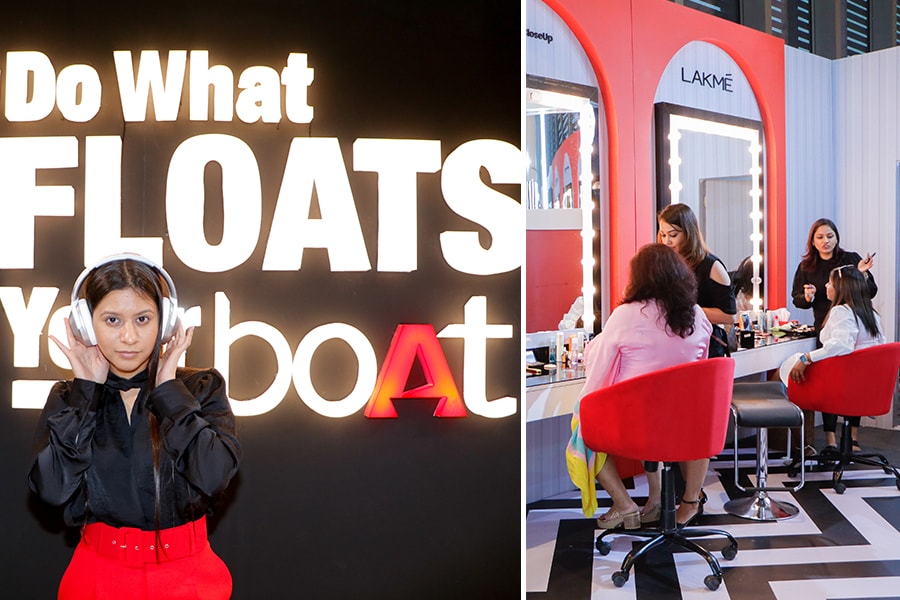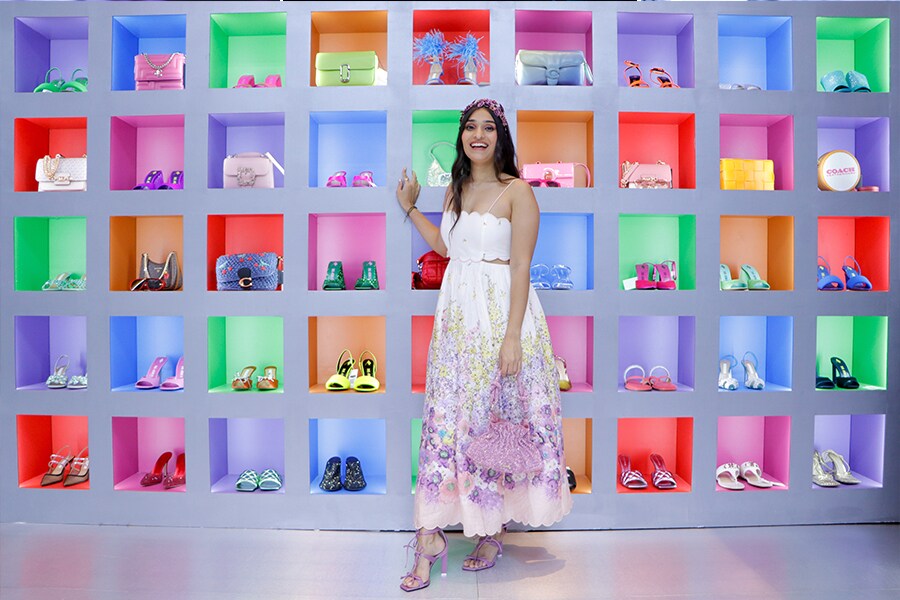Why brands are betting big on fashion designers
Over the years, corporate interest in the world of high-end fashion has been increasing, through sponsorship as well as investments. And it's creating a win-win situation for all stakeholders


The first thing we noticed as we arrived at the third floor of the Jio World Convention Centre in Mumbai for the 2022 Lakmé Fashion Week (LFW) earlier this month, was the presence of a flock of brands. Right outside the entrance to the runway was a NEXA Grand Vitara there was a funky set-up by boAt right next to it and on the other end was an entire wall of paintings celebrating 70 years of Lakme in India. At every set-up there were at least two to three influencers or celebrities—all dressed to the nines—clicking photos or videos. Clearly, the brands were getting plenty of bang for their buck.
“In 2008," Sunil Sethi, chairman, Fashion Design Council of India (FDCI) recalls, “when I started my journey, every journalist would ask me, ‘why isn’t there any corporate money in fashion designer labels’?" Today, of course a lot has changed. Over the years, corporate interest in the world of fashion has only been increasing-–be it in the form of sponsorships for fashion weeks, individual collaborations with designers for a brand new collection or in the form of investment.
As far as sponsors are concerned, once they are brought on board, depending on their objective, the organisers suggest a few designers that they could work with. Eventually, the brand decides who they wish to work with.
For brands, it’s the idea of implementing key brand messaging through synergistic storytelling with designers. Bringing their vision to life via a runway showcase on the platform that is witnessed by an immensely large Indian and global fashion community, buyers and consumers ensures visibility like no other, explains Jaspreet Chandok, head of RISE Fashion & Lifestyle. “We take great care in pairing up designers with brands that match organically. Our main aim remains that both partners (brand and designer) get value out of the partnership. Another key trend is that now brands such as Ajio Luxe, Tresemme and Roposo have not tied up with a singular designer but leveraged conversations and activations with the larger fashion community."

boAt and Lakmé installed their kiosks at Jio World Convention Centre for Lakmé Fashion Week x FDCI
Last season, LFW recorded the highest ever sponsored collaborations in its history. This season, too, the platform saw several long-standing partners, who are industry leaders within their own segment, return to collaborate with the platform, says Chandok. “This only goes to show that brands are willing to invest and engage with the Indian fashion industry." Some of the big players who have returned to collaborate with LFW include NEXA, R|Elan, Tencel, realme and Logitech.
The brands might not be directly linked to fashion but the collaborations work. “There are three things that catch everyone’s attention in India–the film industry, cricket and fashion," says Sethi. “So brands such as smartphone brand realme are a great fit, since a majority of the people watch fashion shows on smartphones today. To you realme might not be directly linked to fashion and design, but it is. If the phone is not designed well, people will not buy it."
This year for the showcase at LFW, designer Amit Aggarwal, who is known for his ‘futuristic clothes’, worked with realme. “It was an enriching experience because while we still retained our USP of crafting stories by hand, we could leverage the sense of speed and blacks and whites that they had to offer," says Aggarwal of Onyx, a collection inspired by the design of the realme GT NEO 3T phone.

For realme it was an opportunity to stay engaged with local culture and draw inspiration for upcoming product launches. Madhav Sheth, CEO, realme India, VP, realme and president, realme International Business Group explains that they want to transcend their design philosophy across relevant spaces where their target audience is present. “Such engagements also offer an opportunity to let realme products speak for themselves and showcase their design prowess."
For Logitech too, it was their third collaboration with the Lakmé Fashion Week, which means they are getting the visibility they signed up for. This year the company collaborated with designer duo Saaksha and Kinni for their collection ‘Prism’, which was full of colourful tie-and-dye, geometrical lines and abstract flowers.
Associating with fashion week and designers Saaksha and Kinni helps build not only brand resonance but brand equity as well, says Srinivas Rao Vishnubhotla, country head of Logitech India. “Saaksha and Kinni’s bold and colourful fashion sense is in sync with Logitech’s minimalistic approach and embodies the same brand ethos. With the focus of building a stronger resonance, associations like these will help build a better brand connection and engagement with the millennials."

Tasheen Rahimtoola, founder of Taste Retreat poses at Ajio Luxe kiosk installed at Lakmé Fashion Week x FDCI
Designer Saaksha Bhat explains how collaborating with Logitech was not as challenging as they thought, and the designer had full creative control. “Fashion and tech have a lot more in common than we realise, they both carry significance in our day-to-day lives and can convey our personalities and moods through wardrobe and gadgets," explains Bhat.
Another company, The Lenzing Group, which produces botanic fibres, has been collaborating with LFW for a few years now. Their flagship brand for textiles, Tencel, is a B2B product, for which collaborating with various designers helps. “We cannot make out what the consumer wants, that is something that a retailer or designer like Anju Modi can help us with. This is why we work very closely with designers," says S Jayaraman, senior commercial director, Lenzing Group.
There is no monetary involvement in the tie-up, but they provide the designer with the material. “We don’t stop at a single collection, even now if you go to Ritu Kumar, Anita Dongre or Abraham & Thakore, you will still find our products being used. Retailers and other brands take inspiration from these designers and start incorporating more of Tencel products into their core lines. That’s what helps with our visibility," adds Jayaraman.
For this season, Lakmé partnered with designers Pankaj & Nidhi and Rajesh Pratap Singh to showcase their new skincare product, Lakmé 9to5 Vitamin C+ range, with an aim to bring to the fore the importance of skin preparation and health in beauty. “The shows effortlessly gave form to the glow, vibrancy and freshness of the range in a striking yet subtle rendition of dawn to dusk. We at Lakmé hope to only grow this momentum and bring many more skincare inspired collaborations at Lakmé Fashion Week x FDCI," says Sumati Mattu, head of innovations at Lakmé.

As music is an integral part of all fashion shows, boAt participates in most fashion weeks and in the past they’ve tied up with designers like Kunal Rawal and Masaba Gupta. “This year, they didn’t collaborate with any designer. But you are still asking me about them, which means the set-up outside the runway worked wonders for them. It got them a lot of visibility and brand recall," says Sethi.
For Shantnu & Nikhil, post the strategic partnership with ABFRL, their retail footprint has gone up to 16, with six couture stores and 10 S&N stores across India, including tier-2 cities like Raipur, Ahmedabad and Noida. “Beside this, S&N as a brand has a robust D2C framework with a strategic offline and digital shop-in-shop format with the likes of The Collective, Ajio Luxe, Tata Cliq, Aza, Ogaan, Pernia’s pop up and many more. All of this was possible because, as a business, we got full access to ABFRL’s supply chain network for S&N right from sourcing to manufacturing to distribution, which has clearly given us a more structured control over our creative values and hence the push for scale," says Shantnu Mehra, CEO, Shantnu & Nikhil.
The partnership helped them differentiate between both their brands: S&N by Shantnu Nikhil, a collection of celebration wear and Shantnu & Nikhil, which is ceremonial wear. Adds Mehra, “This brand clarity now helps us focus on our audience with a more accessible outlook."

Earlier this year, Reliance Brands, the brand licensing arm of Reliance Industries (RIL) entered into a 60:40 joint venture with fashion designer Rahul Mishra to create a new ready-to-wear business. In March 2022, it acquired a majority stake in Abraham & Thakore and in April 2022, it acquired 51 percent stake in Abu Jani Sandeep Khosla. The company has also invested in other designers such as Satya Paul, Raghavendra Rathore, Ritu Kumar, Manish Malhotra and Anamika Khanna.
The interest from brands and investors in fashion is only expected to increase from hereon. Sethi explains the demand, “Fashion has now percolated down from metro cities to everywhere in India. There is no bride or groom who gets married without wearing designer wear. This goes to show we [the industry] have been doing something right over the years."
First Published: Oct 28, 2022, 17:00
Subscribe Now